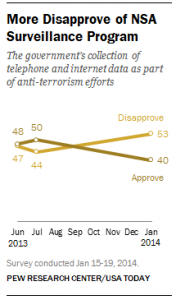Once Again, Pew Misunderstands the Dragnet
 Back in July, I pointed out that Pew’s analysis of a poll on the dragnet had falsely suggested 70% of participants were misinformed on the dragnet when in fact the polling outfit was.
Back in July, I pointed out that Pew’s analysis of a poll on the dragnet had falsely suggested 70% of participants were misinformed on the dragnet when in fact the polling outfit was.
A big chunk of Pew’s readers seem to have a more accurate understanding of the program than Pew’s pollsters.
Consider two of its three headline findings: that 70% use data for purposes other than terrorism and that 63% believe the government is collecting more than metadata.
The first question was asked like this:
Do you think this government data collection effort is only being used to investigate terrorism, or do you think the government uses this data for purposes other than terrorism investigations?
The second question was phrased like this:
Just your impression, does this government program only collect data such as phone numbers and e-mail addresses, or is it also collecting what’s actually being said in the calls and e-mails?
The thing is, both of these questions are true: The government collects content under Section 702, including the incidentally collected content of Americans (which they can go back and search on later). And the 702 program collects information for counter-proliferation, cybersecurity, and other foreign intelligence purposes (the metadata program is reportedly limited to terrorism … if you believe all of Iran is a terrorist organization).
That said, only some of the “other purposes” Pew readers cited — such as gathering information for other crimes, and for national security — match the ones the government admits to. They also name political targeting and general control.
While their report on recent polling is more subtle, they again appear to misunderstand the dragnet. Their headline stat is that approval of surveillance continues to go down. Even there, they suggest — still!! — that all this surveillance only targets terrorism and not (in a practice that is potentially far more intrusive to your average non-Muslim American) cybersecurity as well. (Update: The specific question was “Overall, do you approve or disapprove of the government’s collection of telephone and internet data as part of anti-terrorism efforts?”)
Then they seem befuddled that most respondents who followed Obama’s Friday speech closely don’t think the “reforms” he rolled out will have much affect, one way or another.
NSA Changes Have Little Impact
Obama’s proposed changes to the NSA’s data collection program did not register widely with the public. Just 49% say they heard about the proposed changes, with little difference across partisan groups.
Among those that did hear about the proposals, large majorities of Republicans (86%) and independents (78%) say these changes will not make much difference when it comes to protecting people’s privacy. Among Democrats who have heard of the changes, 56% say they won’t make much difference.
There is little concern that the changes to the NSA’s surveillance activities will hurt the government’s ability to fight terrorism. Overall, 79% of those who have heard about the proposals say they won’t make much difference in the government’s ability to fight terrorism; this view is shared by 85% of independents, 77% of Democrats and 75% of Republicans.
Admittedly, this is mostly just a read of the impact of Obama’s speech, without an assessment of the content of it. Yet it (especially the headline) seems to imagine that Obama rolled out substantive changes, especially affecting Americans. As I have noted, some of the changes he did make do no more than reinstitute current practice, without providing any new enforcement mechanism. But ultimately it is a far read that Obama preserved the dragnet.
So it is actually welcome that most non-partisan Democrats who watched closely understand that.

Last line of next-to-last ‘graph: should ‘far read’ be ‘fair read’?
(Looks like caffeine insuffiencey to me.)
Ain’t it great when the surveyed push back on push polling? Not sure I’d be quite as generous as thee with “the polling outfit was (misinformed)”.
@lefty665: If Pew’s researchers were mostly getting their news on this issue from the Washington, DC press, I wouldn’t be shocked to find that they were genuinely minsinformed.
A more appropriate question would have been “Are you more likely to die of a lightning strike or at the hands of a terrorist?” and follow up with “Should we spend a trillion dollars a year putting up lighting rods all over the country or continue to burn money fighting imaginary terrorists?”